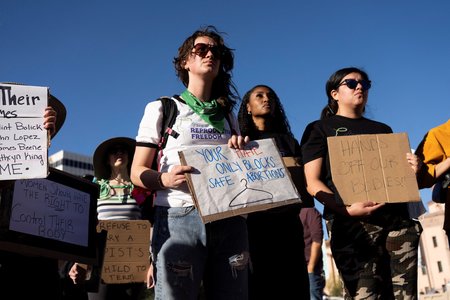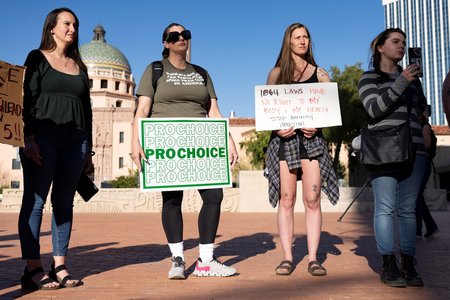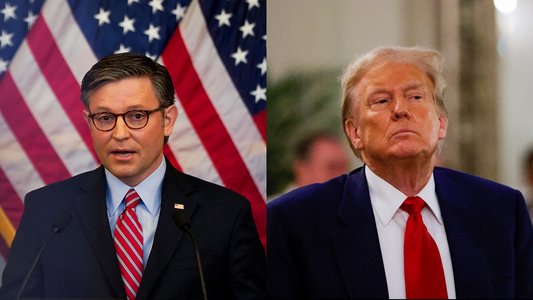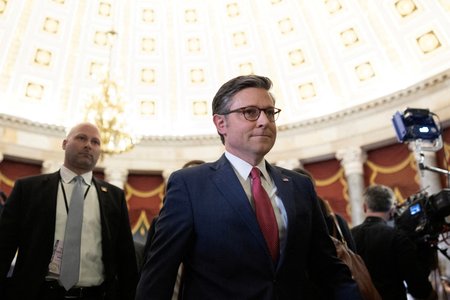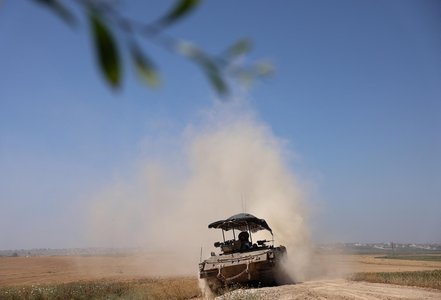I'm Robert Costa and I'm a reporter for the Washington Post. I'm honored and thrilled to be the new moderator of Washington Week.
I'm a reporter. I spend my days roaming through the Capitol or wandering around the White House trying to pick up tidbits of information. And here at Washington Week I'm going to draw out the best information from the best reporters.
I always just loved being part of the news. Worked for my school paper in high school and in college for the school TV station.
I got to intern for Charlie Rose on PBS when I was at Notre Dame and that really taught me about television and how you can have a conversation around the table that really matters.
I went to Notre Dame for my undergrad and I went to Cambridge in England to get a masters, and I studied Winston Churchill and that's some of the most fun I've ever had is spending a year at Cambridge studying Churchill and the Anglo-American relationship.
I live in Washington now but I'm still a Philadelphia guy at heart. I go back to Bucks County, north of Philly, where I grew up quite a bit. My parents still live there and it's right by the Delaware River so that's where I really got my love of history because I grew up about a mile or so from where George Washington crossed the Delaware. They call it Washington's Crossing. And so growing up north of Philadelphia you get to know Philadelphia, Independence Hall, and of course Washington's Crossing.
So that love of history that I have and the love of politics, it was given to me at an early age just living in the Philadelphia area.
I just love learning new things. Picking up information. Listening and trying to figure out how all, it all works. Especially when it comes to national politics.
Being a national political reporter is like sitting in the dugout of a baseball game. You get to see all the action and all of the players up close and then you’ve got to write about it.
I save every audio file of every interview I do because I think one day I'll write a big book about everything I've seen and heard, and so I have a stash that one day I'll share. Maybe, maybe someday, not so soon. I also save my notebooks. I got a whole pile of notebooks in my closet of things going back to the 2008 campaign, the 2012 campaign, 2016. I just love being a reporter and the audio, the notebooks, the credentials from the conventions past, I love that stuff just like I love the used books I buy about the presidency and Congress.
If you love politics, you kind of collect things you pick up along the way. And so that's what I always try to do is to see a little knick-knack and to save it as a memory. And I got some Washington Week mugs that I probably shouldn't have taken a few years ago. I do have a couple of Washington Week mugs. Maybe I'll bring them back at some point.
Washington can be a ruthless place for reporters. Everybody's competing. Everybody's staking out each and every event, but at Washington Week that competition falls away on a Friday night. It's about a conversation. And it's a conversation we don't have enough as reporters during the week sometimes, but it's about what's actually happening. What do we know? Let's compare notes. As reporters the best conversation you can always have is with your fellow reporters. I want to bring around this table my biggest rivals, the people I'm competing against each and every day, because they're the best reporters. And you want to talk to the best about what's happening in Washington.
Everyone around the country deserves to know what the best reporters know in Washington. What are they really hearing from the lawmakers, from the officials inside of the White House? That's what we're going to do here at this table, as Washington Week has always done.
You may not know it but I actually started out as a music reporter in high school. I would get two tickets from a record company, go down to Philadelphia, and I'd cover John Mayer, Dave Matthews Band, The Grateful Dead, and I'd interview them backstage and I started to bring them to my high school for concerts. Even brought John Mayer to come play my prom. I've switched from music to politics but it's the same thing sometimes. Covering music's a lot like covering politics: sometimes you’ve got to listen to big egos, pay attention to everything, and just see where the music takes you.
When I'm relaxing I go to rock concerts. I go to Nationals games. I love sports and I love music. I love reading books. By far one of my favorite things to do is to go to used bookstores and to find first edition books, non-fiction, about presidents, or presidential campaigns. I’ve got a whole library in my apartment of all these books going back about Jimmy Carter and Ronald Reagan and Richard Nixon. The presidency fascinates me. Congress fascinates me. And I like the hardcover first editions, maybe they're a little dusty and I've got a pretty good collection. That's how I relax. Put on some, some Phish, some Grateful Dead, read a book about a presidential campaign, maybe Barry Goldwater in '64 or George McGovern in '72, put my feet up and read.
I've had so many mentors to get to where I am right now, and I have so much to learn. Let me say I'm going to be a moderator of Washington Week but really it's just continuing to learn about politics and to be part of a conversation.
And I've had so many people along the way who have been helpful to me, teaching me about politics and history but, most importantly, about how to do journalism right. Dan Balz of the Washington Post, Gwen Ifill, undoubtedly, and so many others have been helpful to me.
I remember coming in to WETA and I thought this was special. This was Washington Week with Gwen Ifill and there was no one who had more force of life, love, and joy for politics than Gwen. I spent time with Gwen in New Hampshire in the 2016 campaign, early on in the primaries, and it was cold and it didn't matter how cold it was in New Hampshire or how crazy things would get on the campaign trail, or with the production, Gwen was always just loving being there. Gwen loved politics. She loved the players. And, most importantly, Gwen appreciated reporting.
I work for the Washington Post, Gwen used to work for the Washington Post and the New York Times. She was a print reporter before she came to Washington Week, and I think it's important to keep that sensibility on the show. That Gwen sensibility that you love reporting, you love the people who really think through substance as they cover national politics.
It's impossible for anyone to follow Gwen Ifill. She was a legend and an inspiration and one of the loveliest people I've ever met. All we can do, and all I can do, is try to continue her legacy and remember her every Friday.
And in Washington Week you're going to continue to see the civility and also the sharpest reporting in town. I want to have all the reporters I know, and that you've known for so long, come to this table, as they always have, and have the greatest conversation of the week. The most interesting conversation of the week.
We have so much ahead of us here at Washington Week. The 2018 midterms, I bet you they're going to be wild. In 2020 who knows what's going to happen? Maybe a primary challenge on the Republican side. A whole new wave of Democrats emerges to run. Every week it's going to be a lot of fun to get the best reporters together and say, "What's really happening? What can we expect next?"
Washington Week is a round table, it's a discussion, I want everybody to be involved and everybody to have a suggestion. This is going be a lot of fun.



